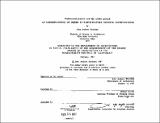| dc.contributor.advisor | Nabeel Hamdi. | en_US |
| dc.contributor.author | Slettebak, John Andrew | en_US |
| dc.contributor.other | Massachusetts Institute of Technology. Dept. of Architecture. | en_US |
| dc.date.accessioned | 2013-03-13T15:35:23Z | |
| dc.date.available | 2013-03-13T15:35:23Z | |
| dc.date.copyright | 1987 | en_US |
| dc.date.issued | 1987 | en_US |
| dc.identifier.uri | http://hdl.handle.net/1721.1/77688 | |
| dc.description | Thesis (M. Arch.)--Massachusetts Institute of Technology, Dept. of Architecture, 1987. | en_US |
| dc.description | MICROFICHE COPY AVAILABLE IN ARCHIVES AND ROTCH. | en_US |
| dc.description | Includes bibliographical references (leaves 60-62). | en_US |
| dc.description.abstract | This paper argues that the professional involved with participatory housing interventions needs a new way to practice. The improvement of housing demands a constructive dialogue in a working context that defies rigid ways of solving problems. Meaningful contribution hinges on the professionals abilities to communicate in this unpredictable environment. The clear explanation of ideas and a willingness to develop them with others, requires a new understanding on which to base professional actions. The argument is built on two issues. A discussion of different ways to get things done explores the issue of order. Procedures and methods order decisions when goals are fixed and interests are easily managed. If these control s are not possible, an approach offers flexibility not found in more regular ways of ordering. The context that requires an approach is the second issue. This is the middle ground, where decisions are ordered by the participation of those involved. Change is assembled piecemeal, as participants meet, discuss and make informed decisions. Order and context are developed in the argument that follows. Housing is presented as a complex subject that avoids simple definition. It changes naturally over time; a characteristic that reflects the needs of users, but has proven a nemesis for those intervening. A brief history of intervention evaluates the housing order that has resulted. It is concluded that natural change requires those affected to also take part in making decisions. This participation means the sharing of control, a condition outside of the present norm. For housing interventions to be participatory, a new context must be recognised - the middle ground. The last section speculates on professional practice on the middle ground. In addition to traditional expertise, the professional must learn to support change. Interactions with a variety of participants require new skills that explain ideas legibly, and then facilitate their development with others. It is proposed that this new understanding is needed in participatory housing interventions. | en_US |
| dc.description.statementofresponsibility | by John Andrew Slettebak. | en_US |
| dc.format.extent | 62 leaves | en_US |
| dc.language.iso | eng | en_US |
| dc.publisher | Massachusetts Institute of Technology | en_US |
| dc.rights | M.I.T. theses are protected by
copyright. They may be viewed from this source for any purpose, but
reproduction or distribution in any format is prohibited without written
permission. See provided URL for inquiries about permission. | en_US |
| dc.rights.uri | http://dspace.mit.edu/handle/1721.1/7582 | en_US |
| dc.subject | Architecture. | en_US |
| dc.title | Professional practice and the middle ground : an understanding of order in participatory housing interventions | en_US |
| dc.title.alternative | Understanding of order in participatory housing interventions | en_US |
| dc.type | Thesis | en_US |
| dc.description.degree | M.Arch. | en_US |
| dc.contributor.department | Massachusetts Institute of Technology. Department of Architecture | |
| dc.identifier.oclc | 16358665 | en_US |
